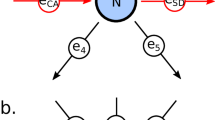Abstract
Into the cell, information from the environment is mainly propagated via signaling pathways which form a transduction network. Here we propose a new algorithm to infer transduction networks from heterogeneous data, using both the protein interaction network and expression datasets. We formulate the inference problem as an optimization task, and develop a message-passing, probabilistic and distributed formalism to solve it. We apply our algorithm to the pheromone response in the baker’s yeast S. cerevisiae. We are able to find the backbone of the known structure of the MAPK cascade of pheromone response, validating our algorithm. More importantly, we make biological predictions about some proteins whose role could be at the interface between pheromone response and other cellular functions.
Preview
Unable to display preview. Download preview PDF.
Similar content being viewed by others
References
Elston, T.C.: Probing pathways periodically. Sci. Signal 1(42) (2008); pe47
Dohlman, H.G., Slessareva, J.E.: Pheromone signaling pathways in yeast. Sci. STKE 2006(364) (December 2006); cm6
Luttrel, L.: Transmembrane signalling by g protein couple receptors. Methods Mol. Biol. 332, 3–49 (2006)
Chen, R.E., Thorner, J.: Function and regulation in MAPK signaling pathways: lessons learned from the yeast Saccharomyces cerevisiae. Biochem. Biophys. Acta 1773(8), 1311–1340 (2007)
Thattai, M., van Oudenaarden, A.: Attenuation of noise in ultrasensitive signaling cascades. Biophys. J. 82(6), 2943–2950 (2002)
Kholodenko, B.N.: Cell-signalling dynamics in time and space. Nat. Rev. Mol. Cell Biol. 7(3), 165–176 (2006)
Ventura, A.C., Sepulchre, J.A., Merajver, S.D.: A hidden feedback in signaling cascades is revealed. PLoS Comput. Biol. 4(3), e1000041 (2008)
Locasale, J.W., Chakraborty, A.K.: Regulation of signal duration and the statistical dynamics of kinase activation by scaffold proteins. PLoS Comput. Biol. 4(6), e1000099 (2008)
Bashor, C.J., Helman, N.C., Yan, S., Lim, W.A.: Using engineered scaffold interactions to reshape MAP kinase pathway signaling dynamics. Science 319(5869), 1539–1543 (2008)
Scott, J., Ideker, T., Karp, R.M., Sharan, R.: Efficient algorithms for detecting signaling pathways in protein interaction networks. J. Comput. Biol. 13(2), 133–144 (2006)
White, A., Ma’yan, A.: Connecting seed lists of mammalian proteins using steiner trees. Nature Precedings (2008)
Scott, M.S., Perkins, T., Bunnell, S., Pepin, F., Thomas, D.Y., Hallett, M.: Identifying regulatory subnetworks for a set of genes. Mol. Cell Proteomics 4(5), 683–692 (2005)
Zhao, X.M., Wang, R.S., Chen, L., Aihara, K.: Uncovering signal transduction networks from high-throughput data by integer linear programming. Nucleic Acids Res. 36(9), e48 (2008)
Bayati, M., Borgs, C., Braunstein, A., Chayes, J., Ramezanpour, A., Zecchina, R.: Statistical mechanics of steiner trees. Phys. Rev. Lett. 101(3), 037208 (2008)
Mézard, M., Parisi, G., Zecchina, R.: Analytic and algorithmic solution of random satisfiability problems. Science 297(5582), 812–815 (2002)
Gavin, A.C., Bosche, M., Krause, R., Grandi, P., Marzioch, M., Bauer, A., Schultz, J., Rick, J.M., Michon, A.M., Cruciat, C.M., Remor, M., Hofert, C., Schelder, M., Brajenovic, M., Ruffner, H., Merino, A., Klein, K., Hudak, M., Dickson, D., Rudi, T., Gnau, V., Bauch, A., Bastuck, S., Huhse, B., Leutwein, C., Heurtier, M.A., Copley, R.R., Edelmann, A., Querfurth, E., Rybin, V., Drewes, G., Raida, M., Bouwmeester, T., Bork, P., Seraphin, B., Kuster, B., Neubauer, G., Superti-Furga, G.: Functional organization of the yeast proteome by systematic analysis of protein complexes. Nature 415(6868), 141–147 (2002)
Chang, W.C., Li, C.W., Chen, B.S.: Quantitative inference of dynamic regulatory pathways via microarray data. BMC Bioinformatics 6, 44 (2005)
Steffen, M., Petti, A., Aach, J., D’haeseleer, P., Church, G.: Automated modelling of signal transduction networks. BMC Bioinformatics 3, 34 (2002)
Johnson, D., Minkoff, M., Phillips, S.: The prize collecting steiner tree problem: theory and practice. In: Proceedings of the eleventh annual ACM-SIAM symposium on Discrete algorithms, Society for Industrial and Applied Mathematics, Philadelphia, PA, USA, pp. 760–769 (2000)
Lucena, A., Resende, M.G.C.: Strong lower bounds for the prize collecting Steiner problem in graphs. Discrete Applied Mathematics 141(1-3), 277–294 (2004)
Bayati, M., Braunstein, A., Zecchina, R.: A rigorous analysis of the cavity equations for the minimum spanning tree. Journal of Mathematical Physics 49(12), 125206 (2008)
Xenarios, I., Rice, D.W., Salwinski, L., Baron, M.K., Marcotte, E.M., Eisenberg, D.: DIP: the database of interacting proteins. Nucleic Acids Res. 28(1), 289–291 (2000)
Güldener, U., Oesterheld, M., Pagel, P., Ruepp, A., Mewes, H.W., Stümpflen: Mpact: the MIPS protein interaction resource on yeast. Nucleic Acids Res. 34(Database issue), D436–D441 (2006)
Bader, J.S., Chaudhuri, A., Rothberg, J.M., Chant, J.: Gaining confidence in high-throughput protein interaction networks. Nat. Biotechnol. 22(1), 78–85 (2004)
Suthram, S., Shlomi, T., Ruppin, E., Sharan, R., Ideker, T.: A direct comparison of protein interaction confidence assignment schemes. BMC Bioinformatics 7, 360 (2006)
Roberts, C.J., Nelson, B., Marton, M.J., Stoughton, R., Meyer, M.R., Bennett, H.A., He, Y.D., Dai, H., Walker, W.L., Hughes, T.R., Tyers, M., Boone, C., Friend, S.H.: Signaling and circuitry of multiple MAPK pathways revealed by a matrix of global gene expression profiles. Science 287(5454), 873–880 (2000)
The Gene Ontology Consortium: Gene ontology: tool for the unification of biology. Nat. Genet. 25, 25–29 (2000)
Heiman, M.G., Walter, P.: Prm1p, a pheromone-regulated multispanning membrane protein, facilitates plasma membrane fusion during yeast mating. J. Cell Biol. 151(3), 719–730 (2000)
Aguilar, P.S., Engel, A., Walter, P.: The plasma membrane proteins prm1 and fig1 ascertain fidelity of membrane fusion during yeast mating. Mol. Biol. Cell 18(2), 547–556 (2007)
Despons, L., Wirth, B., Louis, V.L., Potier, S., Souciet, J.L.: An evolutionary scenario for one of the largest yeast gene families. Trends Genet. 22(1), 10–15 (2006)
Weigt, M., White, R.A., Szurmant, H., Hoch, J.A., Hwa, T.: Identification of direct residue contacts in protein-protein interaction by message passing. Proc. Natl. Acad. Sci. U S A 106(1), 67–72 (2009)
Author information
Authors and Affiliations
Editor information
Editors and Affiliations
Rights and permissions
Copyright information
© 2009 Springer-Verlag Berlin Heidelberg
About this paper
Cite this paper
Bailly-Bechet, M., Braunstein, A., Zecchina, R. (2009). A Prize-Collecting Steiner Tree Approach for Transduction Network Inference. In: Degano, P., Gorrieri, R. (eds) Computational Methods in Systems Biology. CMSB 2009. Lecture Notes in Computer Science(), vol 5688. Springer, Berlin, Heidelberg. https://doi.org/10.1007/978-3-642-03845-7_6
Download citation
DOI: https://doi.org/10.1007/978-3-642-03845-7_6
Publisher Name: Springer, Berlin, Heidelberg
Print ISBN: 978-3-642-03844-0
Online ISBN: 978-3-642-03845-7
eBook Packages: Computer ScienceComputer Science (R0)




